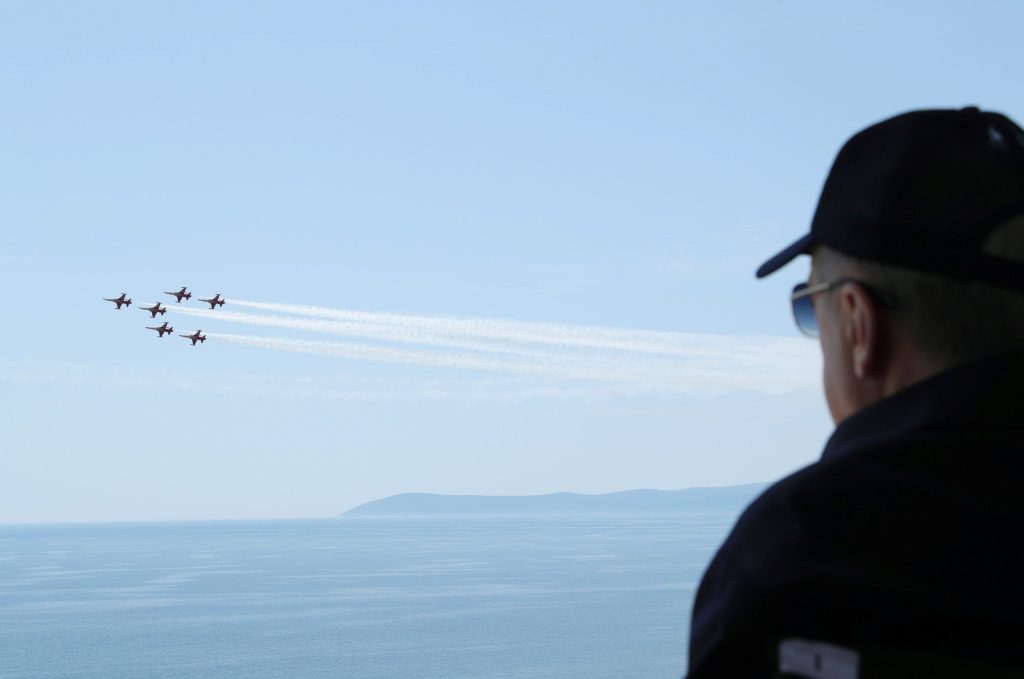Greece views Turkey’s neo-Ottoman ambitions as a significant threat to regional stability and NATO’s cohesion. Turkey’s aspiration to resurrect its Ottoman-era influence, encompassing territories in Greece, Syria, Iraq, Iran, and the Caucasus, creates friction within NATO and jeopardizes international norms. This ambition is evident in Turkey’s assertive actions in the Aegean and Mediterranean Seas, including the “Blue Homeland” military exercises, which Greece interprets as a display of Turkey’s expansionist intentions. Ankara’s claims to Greek islands in the Aegean and even Crete, which hosts a crucial NATO base, are particularly alarming to Athens. This expansionist agenda clashes with Greece’s commitment to international law and the established maritime boundaries.
The escalating tensions between Greece and Turkey, both NATO members, underscore a critical internal challenge for the alliance. While NATO grapples with external threats like Russia’s aggression against Ukraine, the alliance must also address internal divisions and potential conflicts between member states. The dispute over Cyprus, a decades-old conflict, continues to strain relations and raises concerns about the alliance’s ability to maintain unity and effectiveness. Turkey’s pursuit of regional natural resources and assertive geopolitical actions, particularly in the Aegean Sea and the Middle East, further fuels tensions and casts doubt on its commitment to NATO’s collective security objectives.
Beyond territorial disputes, Turkey’s domestic policies and regional actions pose broader challenges for the international community. President Erdoğan’s increasingly authoritarian rule, targeting journalists, women, Kurds, and religious minorities, has raised significant human rights concerns and impeded Turkey’s progress toward joining the European Union. Moreover, Turkey’s involvement in regional conflicts, including its strained relationship with the Syrian Democratic Forces (SDF), a key U.S. ally in the fight against ISIS, complicates the fight against terrorism and jeopardizes regional stability. Ankara’s perception of the Kurdish-affiliated SDF as akin to the PKK, a designated terrorist group, has led to military operations against the SDF, potentially undermining efforts to counter ISIS.
The evolving geopolitical landscape, particularly in the wake of the Syrian conflict and the changing dynamics between the U.S. and Turkey, further exacerbates these tensions. The close relationship between President Trump and President Erdoğan raises questions about how the U.S. will address Turkey’s assertive actions and ensure its continued commitment to NATO’s shared values and security interests. While some argue that President Trump’s influence could moderate Erdoğan’s behavior, others fear it might embolden him to pursue his ambitions more aggressively. This uncertain dynamic underscores the need for a clear and consistent U.S. policy towards Turkey that balances bilateral relations with broader strategic considerations within NATO and the region.
The contrasting defense spending priorities between Greece and Turkey highlight another dimension of the tensions within NATO. While Greece consistently exceeds NATO’s defense spending target of 2% of GDP, ranking among the top spenders in the alliance, Turkey lags behind, raising concerns about its commitment to collective defense. This discrepancy reflects the differing threat perceptions and security priorities within the alliance, underscoring the need for a unified approach to defense spending based on shared assessments of the evolving security environment. The debate over defense spending within NATO, championed by President Trump’s push for a 5% GDP target, further complicates these internal dynamics.
The escalating tensions between Greece and Turkey and the broader implications of Turkey’s assertive posture necessitate a comprehensive and strategic response from NATO and the international community. The alliance must address internal divisions and potential conflicts between member states while maintaining a strong and unified stance against external threats. The international community should encourage dialogue and de-escalation between Greece and Turkey, while also holding Turkey accountable for its human rights record and its actions in the region. A clear and consistent approach to Turkey is crucial for maintaining stability within NATO, promoting regional security, and upholding international law and norms.










